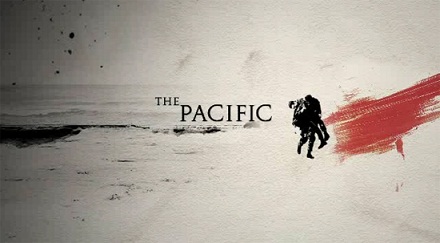I’ve occasionally written about The Pacific for WEEKEND Watchers, but didn’t find myself interested enough to recap each week in the early going. The last few weeks, however, have been damn good and so I thought I’d discuss them just a little before wondering aloud why people aren’t as high on the series. While the middle batch of episodes were watermarks for the action sequences, all of which were painful, exhilarating and gut-wrenching to watch, these last two efforts have been the best character studies, something I felt like the series lacked in earlier episodes.
Everyone has talked about the decision to only follow three primary soldiers in the story and how they’ve wandered in and out of the episodes each week. For a lot of viewers, this has been a major issue with The Pacific, and I can relate. It seems like the writers (smartly) wanted to avoid a lot of the basic training or pre-war cliches we see in these types of products, but because they did so, we as an audience couldn’t quite connect with the characters until this point in the series. It also didn’t help that the story focused so heavily on Leckie from the outset, the character who is the most inward in his emotions, and thus kind of the most boring.
Meanwhile, Basilone looked to be the emotional anchor for the story after his amazing journey in the second hour — and then he was gone. For too long, really. And although episode eight told his whole post-Guadacanal story in completely effective fashion leading up to his death, it would have been nice to have Basilone around a little bit more, if only to make his death that more emotionally-charged, right?
That’s not to take away from the writers’ handling of Sledge, who has taken over the emotional anchor position. I guess we should have seen that one coming, considering he was the young boy at home with the heart ailment at the very beginning. And now, as hour nine depicted, he’s a man who is caught in the middle of this war-zone, afraid to feel because he could lose his edge and still battling with the horrors in front of him. He can’t decide if he’s going to fully embrace the “kill Japs at all cost” routine or be a noble solider who saves injured women. And thankfully, Sledge’s story has been completely effective, making the second half of the series much more enjoyable at least on an emotional level.
But as the series comes to a close here with only an episode to go, I’m still confused as to why people aren’t as high on the series as was expected coming in. I know the Band of Brothers comparisons are a lot to overcome, but despite it’s rocky start, I’ve really enjoyed The Pacific and it’s insane to argue that it is not well-made. So aside from the lack of character attachment in the early going, what else is keeping viewers from caring?
I hate to say it, but could it be World War II over-saturation?
At this point in history, is it possible that we as a culture are full of WWII stories? We’ve seen them told for decades now, with the heroes celebrated as the greatest generation and all that. And it’s not as if there haven’t been good WWII products out there over the years, giving us every angle and a number of different individual stories. So while The Pacific is very damn good at what it is doing, there isn’t a whole lot here we haven’t seen. Sure, we might not have seen it on this scale or this detailed, but the character beats are not foreign to us as audience members.
What does that say about our culture, which many would argue is fairly dumbed down and unaware of history in general? I’m not sure. I can’t put my finger on whether this is a good or bad thing, and perhaps it is neither. Perhaps we are just done with WWII, inasmuch that a pay cable series highlight it won’t be a substantial ratings success. There is certainly still some interest, but maybe not as much as was to be expected. I wonder if anyone else has noticed this or felt the same way when talking to people about the series.


Leave a comment